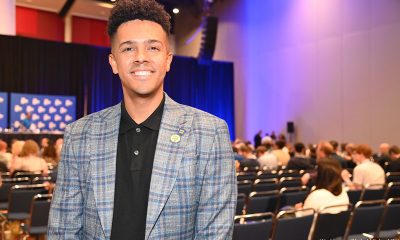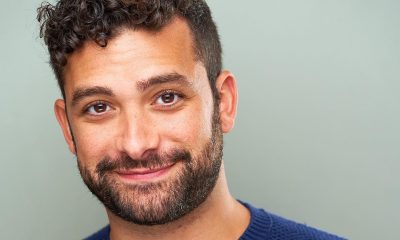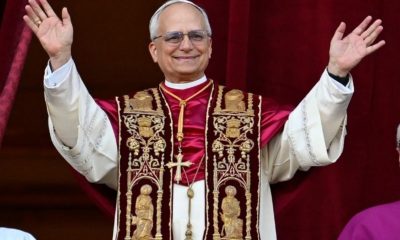homepage news
Why does website say Barrett worked at anti-LGBTQ firm earlier than she disclosed?
Trump nominee to Supreme Court admitted to ties to Alliance Defending Freedom
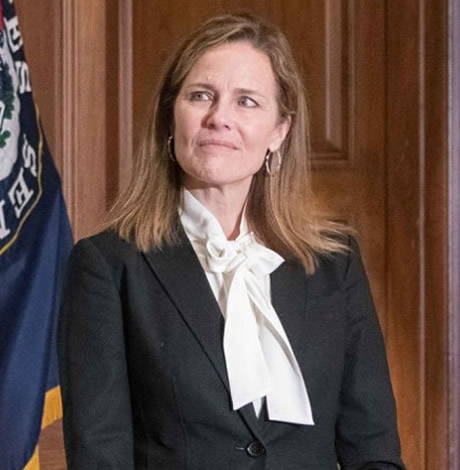
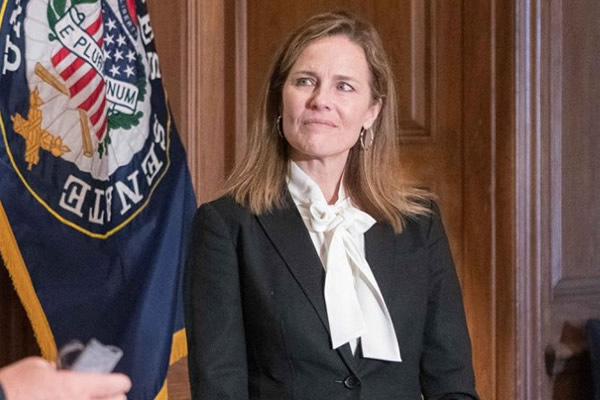
Amy Coney Barrett, whom President Trump has nominated to replace the late Ruth Bader Ginsburg on the U.S. Supreme Court, has admitted to accepting speaking fees from the anti-LGBTQ legal firm Alliance Defending Freedom — but the group’s website suggests she had ties to the group that were broader and earlier than she previously disclosed.
Although the legal firm insists Barrett’s previous disclosures were “entirely accurate and complete” and the webpage in question was retroactively updated to include her work at a later time, Barrett is likely to face questions about whether it reflects she wasn’t truthful about her work with Alliance Defending Freedom, as well as her ties to the anti-LGBTQ legal firm generally, when she comes before the Senate Judiciary Committee next week.
According to the webpage, which was still posted on Alliance Defending Freedom’s website as of Friday, Barrett was a “past faculty member” for the Blackstone Legal Fellowship, which is operated by the ant-LGBTQ legal firm and seeks to inspire in students a “distinctly Christian worldview in every area of law.” The date on that webpage is Jan. 1, 2009, which is earlier than the time period of 2011 and 2017 when she admitted to having a total of five speaking engagements with the fellowship.
Barrett didn’t disclose any work with Blackstone to the Senate Judiciary Committee prior to 2011 when Trump previously nominated her three years ago for a seat on the U.S. Seventh Circuit Court of Appeals. Moreover, the suggestion Barrett was a “past faculty member” appears broader than her work as a past speaker with the fellowship as she disclosed at the time to the committee, although that could be splitting hairs.
Bolstering the evidence Barrett had a broader role at the Blackstone Legal Fellowship than she previously disclosed in 2017 is a contemporaneous article in the Daily Signal, which is run by the conservative Heritage Foundation, on the exchange she had during her confirmation hearing with Sen. Al Franken (D-Minn.).
“Barrett, a Catholic, taught constitutional law to students accepted for ADF’s summertime Blackstone Legal Fellowship, which she testified she had heard about from colleagues and law students she respects,” the article says.
But, according to ADF, any conclusion Barrett wasn’t untruthful in previous testimony based on that webpage is incorrect. Although the webpage was dated Jan. 1. 2009, an ADF spokesperson said it was updated subsequently to reflect Barrett’s work as a speaker beginning in 2011, but kept the same date when it was originally posted.
“The information that Judge Barrett provided in her Senate Judiciary Questionnaire about her presentations at the Blackstone Legal Fellowship was, to our knowledge, entirely accurate and complete,” an ADF spokesperson said. “The first time that she spoke at Blackstone was in 2011. The date on the webpage you referenced represents when the page was first published. We subsequently edited information to add new speakers who presented at Blackstone in later years. Judge Barrett was one of several speakers who were added later.”
Evidence supporting Alliance Defending Freedom’s claim the webpage was updated at a later time is the inclusion on the list of Kyle Duncan, now a judge on the U.S. Circuit Fifth Court of Appeals. The webpage designates him as general counsel for Becket Law, but he didn’t hold that position until 2012, well after the 2009 date on the webpage.
The Heritage Foundation didn’t respond to repeated requests from the Blade to comment on why the Daily Signal article states she taught constitutional law for Blackstone’s summertime program when the issue Franken and Barrett discussed was speaking fees, nor did Alliance Defending Freedom respond to a follow-up email on whether characterizing Barrett’s work as a past faculty member indicates she had broader work than the speaking engagements she disclosed.
If Barrett failed to disclose in 2017 any work with Alliance Defending Freedom, it would be consistent with a flurry of recent news reports on work Barrett had failed to report to the Senate Judiciary Committee. As widely reported this week, Barrett was among the signatories of a 2006 newspaper ad that was against abortion access and called Roe v. Wade “barbaric,” yet she failed to disclosed that in material to the Senate Judiciary Committee.
On Friday, NBC News’ Heidi Przybyla also reported Barrett failed to include on her Senate Judiciary disclosure forms a notable case in which she was one of two lead attorneys defending a Pittsburgh steel magnate accused of helping drive a major Pennsylvania Hospital System into bankruptcy. On the same day, CNN’s Andrew Kaczynski and Em Steck reported Barrett failed to disclose two talks she gave in 2013 hosted by two anti-abortion student groups where she taught at University of Notre Dame law school on paperwork provided to the Senate ahead of her confirmation hearing to become the next Supreme Court justice.
Even based on her admitted work with Alliance Defending Freedom, Barrett has faced criticism for her ties to the anti-LGBTQ group, including in the exchange she had in 2017 with Franken, who questioned her about taking two $2,100 payments in speaking fees from the organization.
Under scrutiny by Franken, Barrett initially said she wasn’t aware of Blackstone’s mission or its affiliation when she agreed to speak to the legal fellowship in 2011.
“I’m invited to give a lot of talks as a law professor and it is not — I don’t know what all of ADF’s policy positions are and it’s never been my practice to investigate all of the policy positions of a group that invites me to speak,” Barrett said.
Barrett added she wasn’t aware of Blackstone’s affiliation with the Alliance Defending Freedom until she “received the honorarium and saw the ADF on the check,” then said she didn’t remember exactly when she found out, then said “by the time I spoke, she was aware” Blackstone was affiliated with Alliance Defending Freedom. All in all, she gave a total of three explanations under Franken’s questioning.
Alliance Defending Freedom, which operates Blackstone, has been a leading law firm seeking to halt the advancement of LGBTQ rights or roll them back, often in the name of “religious liberty.” This year alone, the legal group represented Harris Funeral Homes in Michigan, which fired funeral director Aimee Stephens for being transgender, in a case that reached the U.S. Supreme Court, which ultimately ruled terminating her because of her gender identity was illegal under Title VII of the Civil Rights Act of 1964.
The anti-LGBTQ legal firm also represented Jack Phillips, the owner of Masterpiece Cakeshop who asserted a First Amendment right to refuse to make a custom-made wedding cake to same-sex couples despite the non-discrimination law in Colorado. The Supreme Court took up the case and issued a narrow ruling for Phillips, determining the Colorado Civil Rights Commission harbored anti-religion bias in adjudicating his case.
Alliance Defending Freedom also submitted an amicus brief in 2015 before the Supreme Court against same-sex marriage, arguing “same-sex couples cannot advance the states’ legitimate interest to encourage childrearing by both biological parents.” (John Bursch, who argued in favor of state bans on same-sex marriage before the Supreme Court as Michigan solicitor general, later argued on behalf of Alliance Defending Freedom before the court in the Harris Funeral Homes case.)
The anti-LGBTQ legal firm has also had a hand in state legislation intended to allow discrimination against LGBTQ people in the name of religious freedom and measures prohibiting transgender people from using the restroom consistent with their gender identity. Going back further, the legal firm filed an amicus brief in favor of state laws criminalizing same-sex relations in the Lawrence v. Texas case before the Supreme Court in 2003, and filed an intervention before the European Court of Human Rights in 2015 against allowing transgender people to change the gender marker on their IDs without undergoing gender reassignment surgery leading to sterilization.
On that basis, Franken said during Barrett’s 2017 confirmation hearing the legal firm “supported the recriminalization of homosexuality” and “has defended state-sanctioned sterilization of transgender people,” in addition to linking homosexuality to pedophilia and “claiming a homosexual agenda will destroy Christianity and society.” The Southern Poverty Law Center, as Franken noted, has labeled the anti-LGBTQ legal firm a hate group.
Barrett, however, challenged the idea labelling Alliance Defending Freedom was accurate in her 2017 responses to Franken during the Senate Judiciary Committee, backing that up by saying a reputable international law firm had represented the law firm before the Supreme Court.
“I did not have that impression of ADF,” Barrett said. “And ADF, if it were truly a hate group, it wouldn’t be co-counselor right now. It has a brief in the Supreme Court with WilmerHale, which is one of the most reputable and esteemed law firms in the country, and they wouldn’t be co-counsel with ADF if it were a hate group. I assure you they wouldn’t be co-counsel with the KKK. I gather that the Southern Poverty Law Center’s designation of ADF as a hate group is controversial.”
Although Franken chided Barrett for stating she has a practice of accepting speaking fees from Alliance Defending Freedom without knowing more about it, the issue wasn’t enough to sink her confirmation in 2017.
The Senate confirmed Barrett to the Seventh Circuit by a vote of 55-43 amid criticism from social conservatives that Senate Democrats inappropriately held Barrett’s faith against her, including Sen. Dianne Feinstein (D-Calif.), who told Barrett “the dogma lives loudly within you, and that is a concern.”
Alliance Defending Freedom’s legal positions would be consistent with the personal views expressed by Barrett, who in 2015 co-signed a letter with other Catholic women to religious leaders affirming marriage is between a man and a woman and the sexual difference between men and women was significant, and called the Obama administration interpreting transgender protections under Title IX of the Education Amendments of 1972, which bars discrimination on the basis of sex in education, a “strain” on the statute.
Feinstein, top Democrat on the Senate Judiciary Committee, issued a statement Thursday warning Barrett would be a threat to LGBTQ rights if the Senate confirmed her to the Supreme Court.
“In recent years we’ve seen unprecedented gains in the recognition of Constitutionally protected rights for the LGBT community, thanks largely to the Supreme Court,” Feinstein said. “Five years ago, in Obergefell v. Hodges, the court found that the Constitution protects the right to marriage equality. And just four months ago, the court confirmed that Title VII’s protection against employment discrimination includes LGBT workers. But, this progress is in jeopardy if Republicans are successful in rushing through the confirmation of a conservative justice.”
Barrett’s personal views on LGBTQ rights, as well as her ties to Alliance Defending Freedom, will likely come into focus during her confirmation hearing next week before the Senate Judiciary Committee, in addition to questions on whether she’d overturn Roe v. Wade or marriage equality after an unexpected statement from U.S. Associate Justices Clarence Thomas and Samuel Alito this week declaring war on the 2015 Obergefell decision.
White House Deputy Press Secretary Judd Deere, in response to the Blade’s inquiry on the material on the Alliance Defending Freedom’s website, said Barrett has drawn a distinction between her personal views and her approach to the law.
“Judge Barrett has said that as a judge she’s not a policymaker and that it’s not appropriate for her or any judge to follow their personal convictions in deciding a case, which is also one of the many reasons President Trump laid out as to why he selected her as his nominee to the Supreme Court,” Deere said.
Barrett didn’t respond to a request to comment for this article in response to an inquiry to the email account she holds as a law professor at University of Notre Dame in South Bend, Ind.
homepage news
Honoring the legacy of New Orleans’ 1973 UpStairs Lounge fire
Why the arson attack that killed 32 gay men still resonates 50 years later

On June 23 of last year, I held the microphone as a gay man in the New Orleans City Council Chamber and related a lost piece of queer history to the seven council members. I told this story to disabuse all New Orleanians of the notion that silence and accommodation, in the face of institutional and official failures, are a path to healing.
The story I related to them began on a typical Sunday night at a second-story bar on the fringe of New Orleans’ French Quarter in 1973, where working-class men would gather around a white baby grand piano and belt out the lyrics to a song that was the anthem of their hidden community, “United We Stand” by the Brotherhood of Man.
“United we stand,” the men would sing together, “divided we fall” — the words epitomizing the ethos of their beloved UpStairs Lounge bar, an egalitarian free space that served as a forerunner to today’s queer safe havens.
Around that piano in the 1970s Deep South, gays and lesbians, white and Black queens, Christians and non-Christians, and even early gender minorities could cast aside the racism, sexism, and homophobia of the times to find acceptance and companionship for a moment.
For regulars, the UpStairs Lounge was a miracle, a small pocket of acceptance in a broader world where their very identities were illegal.
On the Sunday night of June 24, 1973, their voices were silenced in a murderous act of arson that claimed 32 lives and still stands as the deadliest fire in New Orleans history — and the worst mass killing of gays in 20th century America.
As 13 fire companies struggled to douse the inferno, police refused to question the chief suspect, even though gay witnesses identified and brought the soot-covered man to officers idly standing by. This suspect, an internally conflicted gay-for-pay sex worker named Rodger Dale Nunez, had been ejected from the UpStairs Lounge screaming the word “burn” minutes before, but New Orleans police rebuffed the testimony of fire survivors on the street and allowed Nunez to disappear.
As the fire raged, police denigrated the deceased to reporters on the street: “Some thieves hung out there, and you know this was a queer bar.”
For days afterward, the carnage met with official silence. With no local gay political leaders willing to step forward, national Gay Liberation-era figures like Rev. Troy Perry of the Metropolitan Community Church flew in to “help our bereaved brothers and sisters” — and shatter officialdom’s code of silence.
Perry broke local taboos by holding a press conference as an openly gay man. “It’s high time that you people, in New Orleans, Louisiana, got the message and joined the rest of the Union,” Perry said.
Two days later, on June 26, 1973, as families hesitated to step forward to identify their kin in the morgue, UpStairs Lounge owner Phil Esteve stood in his badly charred bar, the air still foul with death. He rebuffed attempts by Perry to turn the fire into a call for visibility and progress for homosexuals.
“This fire had very little to do with the gay movement or with anything gay,” Esteve told a reporter from The Philadelphia Inquirer. “I do not want my bar or this tragedy to be used to further any of their causes.”
Conspicuously, no photos of Esteve appeared in coverage of the UpStairs Lounge fire or its aftermath — and the bar owner also remained silent as he witnessed police looting the ashes of his business.
“Phil said the cash register, juke box, cigarette machine and some wallets had money removed,” recounted Esteve’s friend Bob McAnear, a former U.S. Customs officer. “Phil wouldn’t report it because, if he did, police would never allow him to operate a bar in New Orleans again.”
The next day, gay bar owners, incensed at declining gay bar traffic amid an atmosphere of anxiety, confronted Perry at a clandestine meeting. “How dare you hold your damn news conferences!” one business owner shouted.
Ignoring calls for gay self-censorship, Perry held a 250-person memorial for the fire victims the following Sunday, July 1, culminating in mourners defiantly marching out the front door of a French Quarter church into waiting news cameras. “Reverend Troy Perry awoke several sleeping giants, me being one of them,” recalled Charlene Schneider, a lesbian activist who walked out of that front door with Perry.

Esteve doubted the UpStairs Lounge story’s capacity to rouse gay political fervor. As the coroner buried four of his former patrons anonymously on the edge of town, Esteve quietly collected at least $25,000 in fire insurance proceeds. Less than a year later, he used the money to open another gay bar called the Post Office, where patrons of the UpStairs Lounge — some with visible burn scars — gathered but were discouraged from singing “United We Stand.”
New Orleans cops neglected to question the chief arson suspect and closed the investigation without answers in late August 1973. Gay elites in the city’s power structure began gaslighting the mourners who marched with Perry into the news cameras, casting suspicion on their memories and re-characterizing their moment of liberation as a stunt.
When a local gay journalist asked in April 1977, “Where are the gay activists in New Orleans?,” Esteve responded that there were none, because none were needed. “We don’t feel we’re discriminated against,” Esteve said. “New Orleans gays are different from gays anywhere else… Perhaps there is some correlation between the amount of gay activism in other cities and the degree of police harassment.”

An attitude of nihilism and disavowal descended upon the memory of the UpStairs Lounge victims, goaded by Esteve and fellow gay entrepreneurs who earned their keep via gay patrons drowning their sorrows each night instead of protesting the injustices that kept them drinking.
Into the 1980s, the story of the UpStairs Lounge all but vanished from conversation — with the exception of a few sanctuaries for gay political debate such as the local lesbian bar Charlene’s, run by the activist Charlene Schneider.
By 1988, the 15th anniversary of the fire, the UpStairs Lounge narrative comprised little more than a call for better fire codes and indoor sprinklers. UpStairs Lounge survivor Stewart Butler summed it up: “A tragedy that, as far as I know, no good came of.”
Finally, in 1991, at Stewart Butler and Charlene Schneider’s nudging, the UpStairs Lounge story became aligned with the crusade of liberated gays and lesbians seeking equal rights in Louisiana. The halls of power responded with intermittent progress. The New Orleans City Council, horrified by the story but not yet ready to take its look in the mirror, enacted an anti-discrimination ordinance protecting gays and lesbians in housing, employment, and public accommodations that Dec. 12 — more than 18 years after the fire.
“I believe the fire was the catalyst for the anger to bring us all to the table,” Schneider told The Times-Picayune, a tacit rebuke to Esteve’s strategy of silent accommodation. Even Esteve seemed to change his stance with time, granting a full interview with the first UpStairs Lounge scholar Johnny Townsend sometime around 1989.
Most of the figures in this historic tale are now deceased. What’s left is an enduring story that refused to go gently. The story now echoes around the world — a musical about the UpStairs Lounge fire recently played in Tokyo, translating the gay underworld of the 1973 French Quarter for Japanese audiences.
When I finished my presentation to the City Council last June, I looked up to see the seven council members in tears. Unanimously, they approved a resolution acknowledging the historic failures of city leaders in the wake of the UpStairs Lounge fire.
Council members personally apologized to UpStairs Lounge families and survivors seated in the chamber in a symbolic act that, though it could not bring back those who died, still mattered greatly to those whose pain had been denied, leaving them to grieve alone. At long last, official silence and indifference gave way to heartfelt words of healing.
The way Americans remember the past is an active, ongoing process. Our collective memory is malleable, but it matters because it speaks volumes about our maturity as a people, how we acknowledge the past’s influence in our lives, and how it shapes the examples we set for our youth. Do we grapple with difficult truths, or do we duck accountability by defaulting to nostalgia and bluster? Or worse, do we simply ignore the past until it fades into a black hole of ignorance and indifference?
I believe that a factual retelling of the UpStairs Lounge tragedy — and how, 50 years onward, it became known internationally — resonates beyond our current divides. It reminds queer and non-queer Americans that ignoring the past holds back the present, and that silence is no cure for what ails a participatory nation.
Silence isolates. Silence gaslights and shrouds. It preserves the power structures that scapegoat the disempowered.
Solidarity, on the other hand, unites. Solidarity illuminates a path forward together. Above all, solidarity transforms the downtrodden into a resounding chorus of citizens — in the spirit of voices who once gathered ‘round a white baby grand piano and sang, joyfully and loudly, “United We Stand.”

Robert W. Fieseler is a New Orleans-based journalist and the author of “Tinderbox: the Untold Story of the Up Stairs Lounge Fire and the Rise of Gay Liberation.”
homepage news
New Supreme Court term includes critical LGBTQ case with ‘terrifying’ consequences
Business owner seeks to decline services for same-sex weddings

The U.S. Supreme Court, after a decision overturning Roe v. Wade that still leaves many reeling, is starting a new term with justices slated to revisit the issue of LGBTQ rights.
In 303 Creative v. Elenis, the court will return to the issue of whether or not providers of custom-made goods can refuse service to LGBTQ customers on First Amendment grounds. In this case, the business owner is Lorie Smith, a website designer in Colorado who wants to opt out of providing her graphic design services for same-sex weddings despite the civil rights law in her state.
Jennifer Pizer, acting chief legal officer of Lambda Legal, said in an interview with the Blade, “it’s not too much to say an immeasurably huge amount is at stake” for LGBTQ people depending on the outcome of the case.
“This contrived idea that making custom goods, or offering a custom service, somehow tacitly conveys an endorsement of the person — if that were to be accepted, that would be a profound change in the law,” Pizer said. “And the stakes are very high because there are no practical, obvious, principled ways to limit that kind of an exception, and if the law isn’t clear in this regard, then the people who are at risk of experiencing discrimination have no security, no effective protection by having a non-discrimination laws, because at any moment, as one makes their way through the commercial marketplace, you don’t know whether a particular business person is going to refuse to serve you.”
The upcoming arguments and decision in the 303 Creative case mark a return to LGBTQ rights for the Supreme Court, which had no lawsuit to directly address the issue in its previous term, although many argued the Dobbs decision put LGBTQ rights in peril and threatened access to abortion for LGBTQ people.
And yet, the 303 Creative case is similar to other cases the Supreme Court has previously heard on the providers of services seeking the right to deny services based on First Amendment grounds, such as Masterpiece Cakeshop and Fulton v. City of Philadelphia. In both of those cases, however, the court issued narrow rulings on the facts of litigation, declining to issue sweeping rulings either upholding non-discrimination principles or First Amendment exemptions.
Pizer, who signed one of the friend-of-the-court briefs in opposition to 303 Creative, said the case is “similar in the goals” of the Masterpiece Cakeshop litigation on the basis they both seek exemptions to the same non-discrimination law that governs their business, the Colorado Anti-Discrimination Act, or CADA, and seek “to further the social and political argument that they should be free to refuse same-sex couples or LGBTQ people in particular.”
“So there’s the legal goal, and it connects to the social and political goals and in that sense, it’s the same as Masterpiece,” Pizer said. “And so there are multiple problems with it again, as a legal matter, but also as a social matter, because as with the religion argument, it flows from the idea that having something to do with us is endorsing us.”
One difference: the Masterpiece Cakeshop litigation stemmed from an act of refusal of service after owner, Jack Phillips, declined to make a custom-made wedding cake for a same-sex couple for their upcoming wedding. No act of discrimination in the past, however, is present in the 303 Creative case. The owner seeks to put on her website a disclaimer she won’t provide services for same-sex weddings, signaling an intent to discriminate against same-sex couples rather than having done so.
As such, expect issues of standing — whether or not either party is personally aggrieved and able bring to a lawsuit — to be hashed out in arguments as well as whether the litigation is ripe for review as justices consider the case. It’s not hard to see U.S. Chief Justice John Roberts, who has sought to lead the court to reach less sweeping decisions (sometimes successfully, and sometimes in the Dobbs case not successfully) to push for a decision along these lines.
Another key difference: The 303 Creative case hinges on the argument of freedom of speech as opposed to the two-fold argument of freedom of speech and freedom of religious exercise in the Masterpiece Cakeshop litigation. Although 303 Creative requested in its petition to the Supreme Court review of both issues of speech and religion, justices elected only to take up the issue of free speech in granting a writ of certiorari (or agreement to take up a case). Justices also declined to accept another question in the petition request of review of the 1990 precedent in Smith v. Employment Division, which concluded states can enforce neutral generally applicable laws on citizens with religious objections without violating the First Amendment.
Representing 303 Creative in the lawsuit is Alliance Defending Freedom, a law firm that has sought to undermine civil rights laws for LGBTQ people with litigation seeking exemptions based on the First Amendment, such as the Masterpiece Cakeshop case.
Kristen Waggoner, president of Alliance Defending Freedom, wrote in a Sept. 12 legal brief signed by her and other attorneys that a decision in favor of 303 Creative boils down to a clear-cut violation of the First Amendment.
“Colorado and the United States still contend that CADA only regulates sales transactions,” the brief says. “But their cases do not apply because they involve non-expressive activities: selling BBQ, firing employees, restricting school attendance, limiting club memberships, and providing room access. Colorado’s own cases agree that the government may not use public-accommodation laws to affect a commercial actor’s speech.”
Pizer, however, pushed back strongly on the idea a decision in favor of 303 Creative would be as focused as Alliance Defending Freedom purports it would be, arguing it could open the door to widespread discrimination against LGBTQ people.
“One way to put it is art tends to be in the eye of the beholder,” Pizer said. “Is something of a craft, or is it art? I feel like I’m channeling Lily Tomlin. Remember ‘soup and art’? We have had an understanding that whether something is beautiful or not is not the determining factor about whether something is protected as artistic expression. There’s a legal test that recognizes if this is speech, whose speech is it, whose message is it? Would anyone who was hearing the speech or seeing the message understand it to be the message of the customer or of the merchants or craftsmen or business person?”
Despite the implications in the case for LGBTQ rights, 303 Creative may have supporters among LGBTQ people who consider themselves proponents of free speech.
One joint friend-of-the-court brief before the Supreme Court, written by Dale Carpenter, a law professor at Southern Methodist University who’s written in favor of LGBTQ rights, and Eugene Volokh, a First Amendment legal scholar at the University of California, Los Angeles, argues the case is an opportunity to affirm the First Amendment applies to goods and services that are uniquely expressive.
“Distinguishing expressive from non-expressive products in some contexts might be hard, but the Tenth Circuit agreed that Smith’s product does not present a hard case,” the brief says. “Yet that court (and Colorado) declined to recognize any exemption for products constituting speech. The Tenth Circuit has effectively recognized a state interest in subjecting the creation of speech itself to antidiscrimination laws.”
Oral arguments in the case aren’t yet set, but may be announced soon. Set to defend the state of Colorado and enforcement of its non-discrimination law in the case is Colorado Solicitor General Eric Reuel Olson. Just this week, the U.S. Supreme Court announced it would grant the request to the U.S. solicitor general to present arguments before the justices on behalf of the Biden administration.
With a 6-3 conservative majority on the court that has recently scrapped the super-precedent guaranteeing the right to abortion, supporters of LGBTQ rights may think the outcome of the case is all but lost, especially amid widespread fears same-sex marriage would be next on the chopping block. After the U.S. Tenth Circuit Court of Appeals ruled against 303 Creative in the lawsuit, the simple action by the Supreme Court to grant review in the lawsuit suggests they are primed to issue a reversal and rule in favor of the company.
Pizer, acknowledging the call to action issued by LGBTQ groups in the aftermath of the Dobbs decision, conceded the current Supreme Court issuing the ruling in this case is “a terrifying prospect,” but cautioned the issue isn’t so much the makeup of the court but whether or not justices will continue down the path of abolishing case law.
“I think the question that we’re facing with respect to all of the cases or at least many of the cases that are in front of the court right now, is whether this court is going to continue on this radical sort of wrecking ball to the edifice of settled law and seemingly a goal of setting up whole new structures of what our basic legal principles are going to be. Are we going to have another term of that?” Pizer said. “And if so, that’s terrifying.”
homepage news
Kelley Robinson, a Black, queer woman, named president of Human Rights Campaign
Progressive activist a veteran of Planned Parenthood Action Fund

Kelley Robinson, a Black, queer woman and veteran of Planned Parenthood Action Fund, is to become the next president of the Human Rights Campaign, the nation’s leading LGBTQ group announced on Tuesday.
Robinson is set to become the ninth president of the Human Rights Campaign after having served as executive director of Planned Parenthood Action Fund and more than 12 years of experience as a leader in the progressive movement. She’ll be the first Black, queer woman to serve in that role.
“I’m honored and ready to lead HRC — and our more than three million member-advocates — as we continue working to achieve equality and liberation for all Lesbian, Gay, Bisexual, Transgender, and Queer people,” Robinson said. “This is a pivotal moment in our movement for equality for LGBTQ+ people. We, particularly our trans and BIPOC communities, are quite literally in the fight for our lives and facing unprecedented threats that seek to destroy us.”
The next Human Rights Campaign president is named as Democrats are performing well in polls in the mid-term elections after the U.S. Supreme Court overturned Roe v. Wade, leaving an opening for the LGBTQ group to play a key role amid fears LGBTQ rights are next on the chopping block.
“The overturning of Roe v. Wade reminds us we are just one Supreme Court decision away from losing fundamental freedoms including the freedom to marry, voting rights, and privacy,” Robinson said. “We are facing a generational opportunity to rise to these challenges and create real, sustainable change. I believe that working together this change is possible right now. This next chapter of the Human Rights Campaign is about getting to freedom and liberation without any exceptions — and today I am making a promise and commitment to carry this work forward.”
The Human Rights Campaign announces its next president after a nearly year-long search process after the board of directors terminated its former president Alphonso David when he was ensnared in the sexual misconduct scandal that led former New York Gov. Andrew Cuomo to resign. David has denied wrongdoing and filed a lawsuit against the LGBTQ group alleging racial discrimination.






